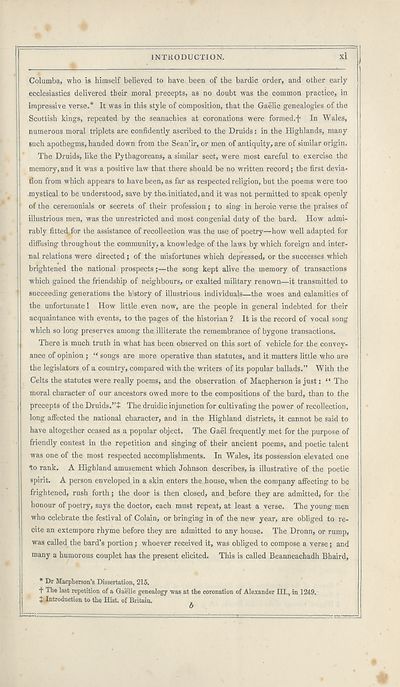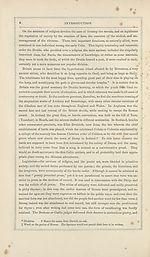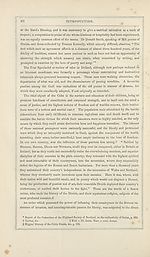Books and other items printed in Gaelic from 1871 to 1900 > Sar-obair nam bard gaelach, or, The beauties of Gaelic poetry, and lives of the Highland bards
(25) Page xi
Download files
Complete book:
Individual page:
Thumbnail gallery: Grid view | List view

INTRODUCTION. xi
Columba, who is himself believed to have been of the bardic order, and other early
ecclesiastics delivered their moral precepts, as no doubt was the common practice, in
impressive verse.* It was in this style of composition, that the Gaelic genealogies of the
Scottish kings, repeated by the seanachies at coronations were formed.f In Wales,
numerous moral triplets are confidently ascribed to the Druids: in the Highlands, many
such apothegms, handed down from the Sean’ir, or men of antiquity, are of similar origin.
The Druids, like the Pythagoreans, a similar sect, were most careful to exercise the
memory, and it was a positive law that there should be no written record; the first devia¬
tion from which appears to have been, as far as respected religion, but the poems w ere too
mystical to be understood, save by the initiated, and it was not permitted to speak openly
of the ceremonials or secrets of their profession; to sing in heroic verse the praises of
illustrious men, was the unrestricted and most congenial duty of the bard. How admi¬
rably fitted for the assistance of recollection was the use of poetry—how w ell adapted for
diffusing throughout the community, a knowledge of the laws by which foreign and inter¬
nal relations were directed; of the misfortunes which depressed, or the successes which
brightened the national prospects;—the song kept alive the memory of transactions
which gained the friendship of neighbours, or exalted military renown—it transmitted to
succeeding generations the history of illustrious individuals—the woes and calamities of
the unfortunate! How little even now, are the people in general indebted for their
acquaintance with events, to the pages of the historian ? It is the record of vocal song
which so long preserves among the illiterate the remembrance of bygone transactions.
There is much truth in what has been observed on this sort of vehicle for the convey¬
ance of opinion ; “ songs are more operative than statutes, and it matters little who are
the legislators of a country, compared with the writers of its popular ballads.” With the
Celts the statutes were really poems, and the observation of Macpherson is just: “ The
moral character of our ancestors owed more to the compositions of the bard, than to the
precepts of the Druids.”+ The druidic injunction for cultivating the power of recollection,
long affected the national character, and in the Highland districts, it cannot be said to
have altogether ceased as a popular object. The Gael frequently met for the purpose of
friendly contest in the repetition and singing of their ancient poems, and poetic talent
was one of the most respected accomplishments. In Wales, its possession elevated one
to rank. A Highland amusement which Johnson describes, is illustrative of the poetic
spirit. A person enveloped in a skin enters the house, when the company affecting to be
frightened, rush forth; the door is then closed, and before they are admitted, for the
honour of poetry, says the doctor, each must repeat, at least a verse. The young men
who celebrate the festival of Colain, or bringing in of the new year, are obliged to re¬
cite an extempore rhyme before they are admitted to any house. The Dronn, or rump,
was called the bard’s portion ; w'hoever received it, was obliged to compose a verse; and
many a humorous couplet has the present elicited. This is called Beanneachadh Bhaird,
* Dr Macplierson’s Dissertation, 215.
+ The last repetition of a Gaelic genealogy was at the coronation of Alexander III., in 1249.
J Introduction to the Hist, of Britain.
Columba, who is himself believed to have been of the bardic order, and other early
ecclesiastics delivered their moral precepts, as no doubt was the common practice, in
impressive verse.* It was in this style of composition, that the Gaelic genealogies of the
Scottish kings, repeated by the seanachies at coronations were formed.f In Wales,
numerous moral triplets are confidently ascribed to the Druids: in the Highlands, many
such apothegms, handed down from the Sean’ir, or men of antiquity, are of similar origin.
The Druids, like the Pythagoreans, a similar sect, were most careful to exercise the
memory, and it was a positive law that there should be no written record; the first devia¬
tion from which appears to have been, as far as respected religion, but the poems w ere too
mystical to be understood, save by the initiated, and it was not permitted to speak openly
of the ceremonials or secrets of their profession; to sing in heroic verse the praises of
illustrious men, was the unrestricted and most congenial duty of the bard. How admi¬
rably fitted for the assistance of recollection was the use of poetry—how w ell adapted for
diffusing throughout the community, a knowledge of the laws by which foreign and inter¬
nal relations were directed; of the misfortunes which depressed, or the successes which
brightened the national prospects;—the song kept alive the memory of transactions
which gained the friendship of neighbours, or exalted military renown—it transmitted to
succeeding generations the history of illustrious individuals—the woes and calamities of
the unfortunate! How little even now, are the people in general indebted for their
acquaintance with events, to the pages of the historian ? It is the record of vocal song
which so long preserves among the illiterate the remembrance of bygone transactions.
There is much truth in what has been observed on this sort of vehicle for the convey¬
ance of opinion ; “ songs are more operative than statutes, and it matters little who are
the legislators of a country, compared with the writers of its popular ballads.” With the
Celts the statutes were really poems, and the observation of Macpherson is just: “ The
moral character of our ancestors owed more to the compositions of the bard, than to the
precepts of the Druids.”+ The druidic injunction for cultivating the power of recollection,
long affected the national character, and in the Highland districts, it cannot be said to
have altogether ceased as a popular object. The Gael frequently met for the purpose of
friendly contest in the repetition and singing of their ancient poems, and poetic talent
was one of the most respected accomplishments. In Wales, its possession elevated one
to rank. A Highland amusement which Johnson describes, is illustrative of the poetic
spirit. A person enveloped in a skin enters the house, when the company affecting to be
frightened, rush forth; the door is then closed, and before they are admitted, for the
honour of poetry, says the doctor, each must repeat, at least a verse. The young men
who celebrate the festival of Colain, or bringing in of the new year, are obliged to re¬
cite an extempore rhyme before they are admitted to any house. The Dronn, or rump,
was called the bard’s portion ; w'hoever received it, was obliged to compose a verse; and
many a humorous couplet has the present elicited. This is called Beanneachadh Bhaird,
* Dr Macplierson’s Dissertation, 215.
+ The last repetition of a Gaelic genealogy was at the coronation of Alexander III., in 1249.
J Introduction to the Hist, of Britain.
Set display mode to:
![]() Universal Viewer |
Universal Viewer | ![]() Mirador |
Large image | Transcription
Mirador |
Large image | Transcription
Images and transcriptions on this page, including medium image downloads, may be used under the Creative Commons Attribution 4.0 International Licence unless otherwise stated. ![]()
| Permanent URL | https://digital.nls.uk/107578946 |
|---|
| Description | Out-of-copyright books printed in Gaelic between 1631 and 1900. Also some pamphlets and chapbooks. Includes poetry and songs, religious books such as catechisms and hymns, and different editions of the Bible and the Psalms. Also includes the second book ever published in Gaelic in 1631. |
|---|

